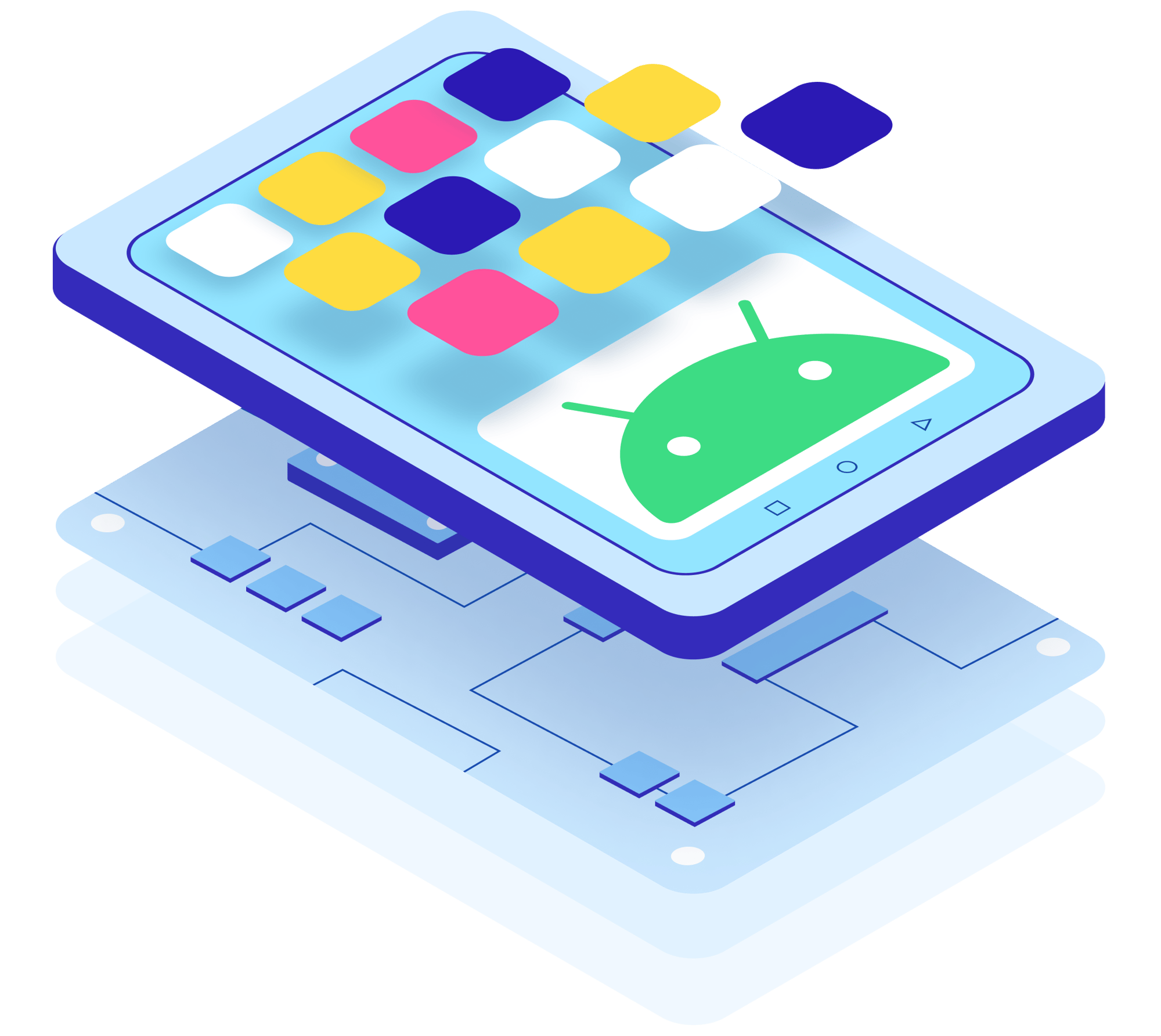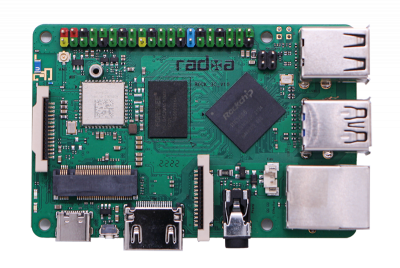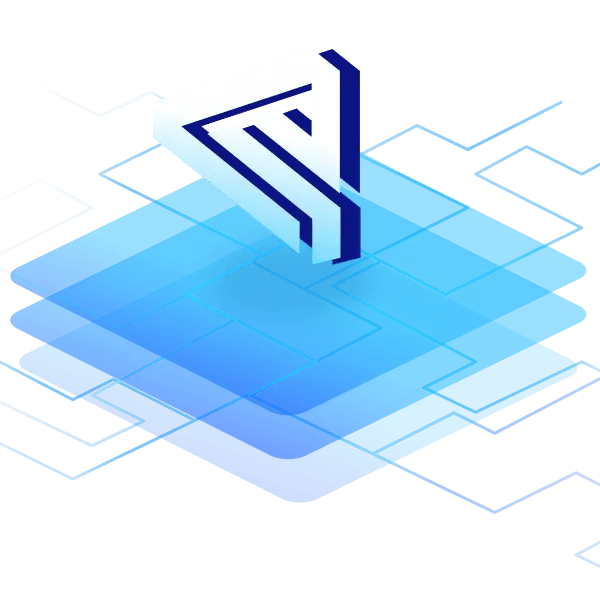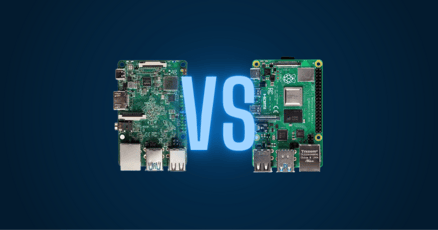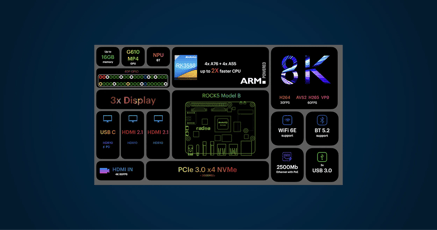The Radxa ROCK 3 Model C is the newest addition to the Radxa ROCK 3 family - a powerful and versatile single board computer that will generate a lot of attention in the SBC electronics community. With its quad-core ARM Cortex-A55 processor, up to 8GB RAM, and the prospect of support for multiple operating systems, the ROCK 3C is capable of handling a wide range of applications, from building media centers to powering IoT devices.
In this article, we will take a comprehensive look at the capabilities of the Radxa ROCK 3C, exploring its hardware specifications, software support, and performance benchmarks. We will also compare it to the popular single board computer Raspberry Pi 3 Model B.
Whether you are a seasoned developer looking for a low-budget SBC to build your next prototype or a hobbyist interested in experimenting with the latest technology, this article will provide you with all the information you need to make an informed decision about the Radxa ROCK 3C.
Exploring the Radxa ROCK 3C's hardware specifications
Just in time for embedded world, which is currently taking place in Nuremberg (14.03. - 16.03.2023), Radxa announces the availability of the new ROCK 3C board. OKDO and Rockchip have the boards on display at their booths.
Source: Radxa / Twitter / Screenshot
Radxa advertises it's new board as a "low power single board computer up to 4K".
Let's dive into the details and learn more about the new board.
Processing power and system memory
The processing power and memory of a SBC are critical components that determine its ability to handle complex tasks and run multiple applications simultaneously. What does the ROCK 3C has to offer in this regard?
Processing power: The quad-core ARM Cortex-A55 processor
The Radxa ROCK 3C is equipped with an Rockchip RK3566 64bit quad-core ARM Cortex-A55 processor, with a clock speed of up to 1.6GHz. The Cortex-A55 is based on ARM's DynamIQ architecture. The processor makes the ROCK 3C a solid choice for tasks that require high levels of computing power, such as media playback, image and video processing, and IoT applications.
If you want to boost the processing power further and have a bigger budget, you should take a look at the Radxa ROCK 5B. ROCK 5B is powered by the popular SoC Rockchip RK3588 and comes with eight ARM processors - four Cortex-A76 cores with 2.4 GHz and four Cortex-A55 cores with 1.8 GHz.
System memory: Various RAM choices
Typically, the ROCK SBCs come in a variety of RAM capacities, with the price varying accordingly. For instance, the ROCK 3C is equipped with:
- 1 GB LPDDR4-RAM – $39
- 2 GB LPDDR4-RAM – $44
- 4 GB LPDDR4-RAM – $54
- 8 GB LPDDR4-RAM – $74
You can buy the ROCK 3C from Radxa's partners:
The Radxa ROCK 3C comes with a range of connectivity options that make it a versatile choice for a variety of projects relying on peripherals.
It features a Gigabit Ethernet RJ45 port with optional PoE support, which allows for a fast and stable internet connection. ROCK 3C also has multiple USB ports, including one USB 3.0 port and three USB 2.0 ports, which can be used for peripherals such as keyboards, scanners, and other hardware extensions.
In addition to Ethernet, the ROCK has Wi-Fi 5 WLAN module and Bluetooth 5 support, making it easy to connect to wireless networks and devices. For those who need to use custom hardware, the ROCK 3C also has 40-pin Raspberry Pi-compatible GPIO headers, which allow for direct hardware interfacing.
Overall, the connectivity options of the Radxa ROCK 3C are as expected from an SBC in its class.
Storage Options: Choosing the right one for your project
The Radxa ROCK 3C offers an eMMC module socket, as well as a microSD card slot and a M.2 PCIe socket, which can be used to install an NVMe SSD for fast and reliable storage.
Here's a short list of the storage options available on the Radxa ROCK 3C:
- eMMC module socket - 16G/32G/64G/128G available
- microSD card slot - supports up to 128GB uSD card
- M.2 PCIe socket - supports up to 1T M.2 2230 NVMe SSD
Audio and video support: Multimedia capabilities of the ROCK 3C
The Radxa ROCK 3C has several multimedia capabilities that make it a considerable choice for media playback. It features an HDMI 2.0 port, which supports up to 4K resolution at 60fps but doesn’t support dual simultaneous displays. It also has a 3.5mm headphone jack for audio output, as well as a built-in microphone.
Finally, the ROCK 3C has an MIPI-CSI camera connector that allows for the use of a variety of camera modules. Overall, the multimedia options of the Radxa ROCK 3C make it a affordable choice for media-centric projects such as media centers, digital signage, and other audiovisual use cases.
Software: Operating system support for the Radxa ROCK 3C
Radxas' boards usually come supported with an in-house Android and various Linux distributions. The ROCK 3C is no exception and is provided on their ROCK 3 download page.
ROCK 3C Linux
Official Radxa Linux distributions that run on the ROCK 3C (and 3A/B, CM3, E23/25) so far are:
- Debian Bullseye (11)
- Ubuntu Server 20.04
ROCK 3C Android
If you want to install Android instead, you have to be patient, the official distribution for ROCK 3C Android is not yet released (as of 03/16/2023). The preview shows the following version tba soon:
- ROCK 3C Android 11
Third-party images
Several third-party and community-built images are announced for ROCK 3C, such as:
- Armbian
- CRUX-Arm
- Manjaro Image Release
- Slarm64
Get in touch if you are interested in running emteria.OS Android on your ROCK 3C.
Comparing the Radxa ROCK 3C to Raspberry Pi SBCs
As one may have guessed, the ROCK 3C board is the third ROCK 3 SBC from Radxa, with the ROCK 3A having similar specifications and form factor. All three boards were introduced as competition to the Raspberry Pi 3 family, with the ROCK 3B as a direct answer to the Raspberry Pi 3B in particular. It is a cost-optimized version of it predecessors ROCK 3A and 3B.
While the Radxa ROCK 3C generally adheres to the form factor of the Raspberry Pi 3 Model B (85 x 56 mm), it also includes an M.2 PCIe socket that allows for the use of NVMe SSDs.
Below is a table comparing the key technical specifications of the Radxa ROCK 3C and the Raspberry Pi 3B.
| Radxa ROCK 3C | Raspberry Pi 3B | |
|---|---|---|
| Processor |
Rockchip RK3568 |
Broadcom BCM2837B0 |
| CPU cores |
quad-core 64-bit ARM Cortex-A55 |
quad-core 64-bit ARM Cortex-A53 |
| CPU frequency | 1.6 GHz | 1.2 GHz |
| GPU | Mali-G52 | Broadcom VideoCore IV |
| RAM | 1-8GB LPDDR4 | 1GB LPDDR2 |
| Ethernet | Gigabit Ethernet | 100 Base Ethernet |
| Wi-Fi | 802.11 b/g/n/ac, dual-band | 802.11 b/g/n/ac, dual-band |
| Bluetooth | 5.0 | 4.2 |
| USB ports | 1x USB 3.0, 3x USB 2.0 | 4x USB 2.0 |
| GPIO | 40-pin GPIO header | 40-pin GPIO header |
| Storage | microSD, eMMC, NVMe | microSD |
| Dimensions | 85mm x 56mm x 20mm | 85mm x 56mm x 17mm |
| Price | $39 | $40 |
Whether you prefer the ROCK 3C or the Raspberry Pi 3B is up to you. What is certain is that an alternative can be very useful if there are still bottlenecks in the Raspberry Pi procurement.
Wrap-Up and final thoughts on the Radxa ROCK 3
In conclusion, the Radxa ROCK 3C is a powerful and cost-efficient single-board computer that offers a range of features and connectivity options. With its Rockchip RK3568 processor, up to 8GB RAM, and support for NVMe SSDs and WiFi 5, the ROCK 3C is well-suited for a variety of applications, from digital signage to powering machine interfaces.
While the Raspberry Pi 3B may be a more popular option, the ROCK 3C is a good alternative, making it a great choice for users who require high-performance computing in a compact and affordable package. All in all, the Radxa ROCK 3C offers a lot of performance for your money and is definitely worth considering for your next project.
Useful links and sources:
- Radxa Rock 3 hardware specs
- Radxa Rock 3 Model C
- Radxa Rock 3C GPIO pinout
- linuxgizmos.com - Giorgio Mendoza - ROCK3 Model C board starts at $39.00
- CNX Software - Jean-Luc Aufranc - ROCK 3C SBC – A $39+ Raspberry Pi 3 lookalike with Rockchip RK3566-T AI SoC, M.2 NVMe SSD support
- Allnet - global distributor (1GB RAM on stock)
- okDo- global distributor (1GB & 2GB RAM, coming soon)
Build unique Android products with ROCK
See why emteria is the chosen Android™ customization & management platform for product builders — build Android products based on ROCK.
